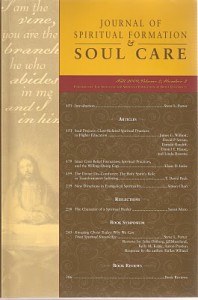
The Journal of Spiritual Formation & Soul Care is a twice-yearly journal from Biola’s Institute for Spiritual Formation. Now in its fourth year of publication, it has a nice track record of publishing interesting, peer-reviewed articles. When the journal was launched, some observers wondered if a journal headquartered at a distinctively Protestant evangelical place like Biola would be able to find enough material to fill its pages year after year. The answer is yes: spiritual formation continues to be a vital topic for academic exploration among evangelicals, and the editors have been resourceful in finding good material. By the way, there are two Torrey profs on the board of editorial consultants (Greg Peters and me).
I especially liked the Spring 2012 issue, a special theme issue on The Formative Reading of Scripture. guest-edited by Tom Schwanda and Jim Wilhoit of Wheaton. “Formative reading” is perhaps the latest attempt to find a serviceable technical term to name the way Christians treat the Bible as a means of grace, a place where God is to be encountered. Lectio divina was the preferred term for a while, but it can be a confusing term to apply across multiple contexts. “Devotional Bible reading” may be the most familiar tag, but it can seem indistinct.
The articles in this issue do a good job of balancing between the admission that on the one hand, evangelicals haven’t been great at this formative reading, and on the other hand, we’ve been great at it. What I mean is, there’s sometimes been an evangelical tendency to pay “greater attention to the intellectual knowledge of the Bible” than to communion with God. But for every rationalist evangelical at the Bible quiz club, there must be five pietist evangelicals at home hovering prayerfully over a verse or two and hearing the voice of God speak through it.
Daniel Block leads with an article about reading the Bible aloud in worship: “That They May Hear”: Biblical Foundations for the Oral Reading of Scripture in Worship.” My church has been experimenting with a variety of ways of placing the public reading of Scripture at the center of our lives together, and it has been powerful.
Next is a study of a nearly forgotten figure, George Swinnock (1627-1673), placed in the complex Puritan tradition of scripture meditation by author J. Stephen Yuille. Tom Schwanda discusses Scripture in the hymns of William Cowper (“The Spirit Breathes Upon the Word”). Evan Howard attempts a historical overview of “Lectio Divina in the Evangelical Tradition,” and manages to bring in both a broad sweep of history and considerable conceptual clarification: this is the most helpful article for a systematic theologian, I think.
Starting around page 100, all the theme articles take a more or less personal turn. Susan Muto contrasts “informational reading” with “formational reading,” but develops her case through repeated appeals to her life: “I can testify from personal experience that…” Klaus Issler does likewise in a very practical essay on “Approaching Formative Scripture Reading with Both Head and Heart.” Leslie Hardin’s “Searching for a Transformative Hermeneutic” tilts toward a more technical vocabulary, but clearly wants to be tested in practice, and concludes with a testimony about finding meaning in the Shema. Similarly, Lori Mitchell McMahon’s “O God, Come to My Assistance: A Journey with Cassian’s Prayer,” is a kind of travelogue of how the author kept encountering an ancient prayer with its origin in the Bible and its chief usage in the liturgy of the hours. This essay is the most rambling and idiosyncratic, but therein is its charm, and it won me over. I’m now officially fascinated by the storied liturgical re-use of Psalm 70:1, am seeing it everywhere, and wondering how I’ve missed it before.
This set of essays on formative Bible reading don’t quite add up to a comprehensive exploration of the subject, but they are the closest thing I’ve seen, which is high praise for a theme issue of a journal.